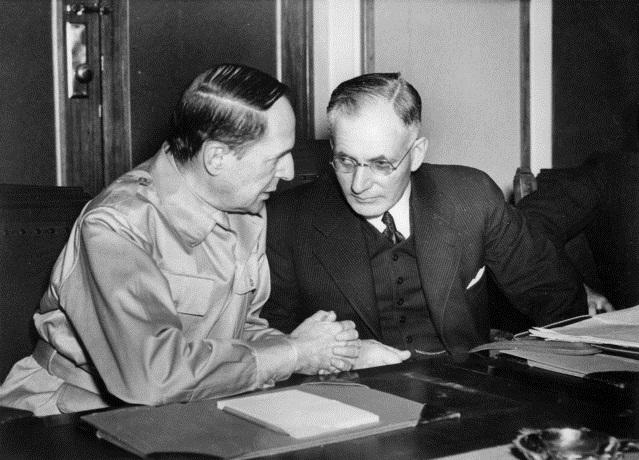
Turn to Douglas MacArthur for a tough and true description of what Australia means to the United States.
It’s 1942. The US commander is meeting Australia’s Prime Minister John Curtin to plan the war against Japan and America’s new alliance with Australia.
MacArthur tells Curtin that America sees Australians as a bunch of bronzed Brits, tied to Britain by blood, sentiment and allegiance to the Crown. That analysis shows its age, but MacArthur’s following thoughts resonate today as they did 72 years ago:
The United States was an ally whose aim was to win the war, and it had no sovereign interest in the integrity of Australia. …In view of the strategical importance of Australia in war with Japan, this course of military action would probably be followed irrespective of the American relationship to the people who might be occupying Australia.
Australia now has a standing alliance with the US and the two countries have done a lot together in the intervening 72 years. Any US general today would be far more polite and lay it on with a trowel; we certainly do. Still, MacArthur’s underlying thought holds. Australia is a marvellous bit of big real estate. It wouldn’t matter if the continent was occupied by Hottentots or Helots, the US would have strategic interests in Oz.
The realism beneath the rhetoric works in both directions. Australia knows the benefits it banks from Uncle Sam. Whether via treaty or mere habit, the US now has an interest in Oz’s territorial integrity. The role and worth of the alliance is one of the currents that runs through Australia’s Defence: Towards a New Era?, the first book of Melbourne University Press’ series on Australian strategy.
The quote from MacArthur—the sort of gem that turns archives dross into diamonds—is from Peter Dean’s fine chapter on the alliance. His work—and several other parts of New Era—rebut the argument of the former Prime Minister, Malcolm Fraser, that Australia is being conned, dunned and mislead by the US.
Peter Dean argues that the benefits Australia draws from the alliance far outweigh the costs. In intelligence, he writes, Australia is ‘an immense beneficiary’ and our access to US technology ‘rivals or surpasses the intelligence sharing access’. Dean endorses the view that from Vietnam to Iraq, Australia has been a hound dog, not a lap dog; no innocent victim, Oz has had a keen nose for its own purposes.
In the China decades of the Asian century, the US is coming afresh to MacArthur’s understanding about Oz real estate. Australia can give American forces strategic depth, operating bases, a site for prepositioning equipment, plus space and facilities for training; that’s what the 25 year Force Posture agreement signed at the August AUSMIN is all about.
MacArthur would have nodded knowingly at the trade-offs between sovereign interest and strategic intent that run through the Force Posture treaty, such as Article XII:
Vessels and vehicles operated by or exclusively for United States Forces may enter, exit, and move freely within the territory and territorial sea of Australia.
As the Americans rebalance our way, they might be impolite enough to ask Oz to put weight behind its usual words. Peter Dean observes:
Australia will find it much more difficult to commit small, niche and largely single service military forces to any potential US-led operation in Southeast Asia or the eastern Indian Ocean. Rather than simply doing our reasonable share as we have done for the past sixty years, it is likely the US will ask Australia to actually “punch above its weight” in the future.
The vision of Australia having to do more with the US where we live rings alarms for Malcolm Fraser. The Fraser lap-dog view of Oz doesn’t give much weight to the value the ol’ hound has extracted from the deal.
For that perspective, see Mark Thomson’s chapter in New Era:
For the past sixty years, the unspoken reality has been that we have “free ridden” on the efforts of the US. Since the late 1970s, it has all but been written into our defence policy. Australia has designed a defence force to defend its territory and explicitly relegated regional security under ANZUS to an afterthought.
As Mark observes, it has been easy for Oz to look good because of its ‘willingness to free ride just a little bit less than others’. MacArthur would understand that, too.
Graeme Dobell is the ASPI journalist fellow. Image courtesy of the Australian War Memorial.